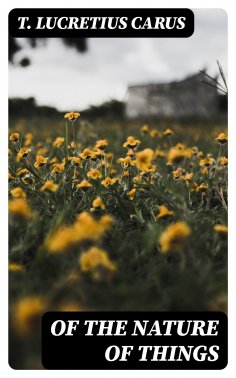Of the Nature of Things
About the eBook
In T. Lucretius Carus's work 'Of the Nature of Things', the reader is taken on an enlightening journey through the world of Epicurean philosophy. Written in the first century B.C., this seminal text explores the principles of atomic theory, the nature of the universe, and the pursuit of happiness through the avoidance of pain. Carus' writing style is both eloquent and engaging, with a poetic essence that adds a depth of beauty to his philosophical arguments. The book is infused with a sense of wonder and curiosity that captivates the reader from start to finish. 'Of the Nature of Things' stands as a timeless classic in the realm of philosophical literature, offering valuable insights into the human experience and the mysteries of the natural world. T. Lucretius Carus, a Roman poet and philosopher, was deeply influenced by the teachings of Epicurus. His work reflects a profound understanding of ancient Greek thought and a passion for exploring the complexities of existence. Carus's dedication to spreading the ideals of Epicureanism shines through in every page of 'Of the Nature of Things'. I highly recommend this book to readers interested in delving into the depths of ancient philosophy and gaining a deeper understanding of the interconnectedness of the world.
About the Author
T. Lucretius Carus, a Roman poet and philosopher, is best remembered for his didactic work 'De rerum natura' (On the Nature of Things), which is a comprehensive exposition of the Epicurean worldview. Though the precise dates of his birth and death are not known, it is presumed he lived during the 1st century BCE. Lucretius's magnum opus, written in hexameter verse, combines a scientific and philosophical treatise with majestic poetry, seeking to explain the Epicurean philosophy to a Roman audience. In 'De rerum natura,' Lucretius covers a wide range of topics including the atomic theory of matter, cosmology, and the nature of the soul, all while advocating for a hedonistic ethics that equated the good life with the pursuit of pleasure and the avoidance of pain. The prevailing aim of his poetic philosophy was to free humans from the fear of death and the supernatural deities that he saw as responsible for so much human unhappiness. 'De rerum natura' was nearly lost to history until rediscovered in the 15th century, influencing the course of the Renaissance and leaving a substantial mark on the scientific and literary landscape. Lucretius has been lauded for his materialist philosophy and for his deep appreciation of the sensuous beauty of the natural world. His work profoundly impacted poets, philosophers, and scientists alike, shaping the intellectual discourse of the Late Republic and beyond.
Product Details
Publisher: DigiCat
Genre: Sprache - Englisch
Language: English
Size: 185 Pages
Filesize: 472.3 KB
ISBN: 8596547315872
Published: Sept. 15, 2022



